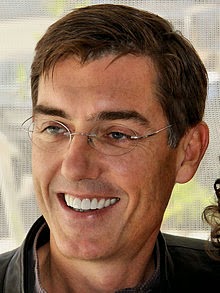The vampires in The Passage are called Virals (for obvious reasons - we imagine a pathogen is a more plausible explanation than a homicidal maniac or evolutionary cannibal or humanoid with hollow teeth containing venom). (Really, aren't we excusing cretins like Vlad the Impaler and Dexter by suggesting a sudden impulse to kill people is excusable - provided they wear a mouth guard, of course, and have some glimmer of humanity in their eyes - how do you even see that?)
One character realises quite soon in the book that if you can see a Viral, you are for all intents and purposes dead, unless you have the reflexes of Clint Eastwood or Jason Bourne. Which is, as it turns out, true. And those who aren't killed by the Virals are killed by their fellow uncontaminated humans, which apocalyptic movies, Vlad the Impaler, war and the tardiness of the UN tell us, too.
These things are like Darkwing Duck but without the duck; Batman without the ridiculous outfit; Riddick without a single chink of humanity in his eyes (the glimmer in his eyes I can see, but I don't think that's humanity). The undead, whose souls presumably dispersed upon death, as generally happens. I hope. The undead moving so fast I can't tell you whether they walk, glide, fly or drop. But you know where they have been. Because these dead people aint ever going to walk again, soul or not.
Are you creeped out? Good. So am I. Because people are still worse.
I am projecting now. This book isn't The Road or Blindness by a long shot. I would slot it onto a shelf next to Wool. There is progressively less horror and philosophy as the protagonists walk the long road, and more human drama. But as you may have noticed, projections of these 'smokes' are snuggled in the rooms around my apartment, watching me. So I am walking around crab-like - metaphorically. Really, I think my walk is more of an amble, as I wander from room to room forgetting why I am there.
I can't tell you what these things represent to me because I have no idea. And as you can imagine, because choosing a brand of coffee is an existential crisis that takes me at least 15 minutes, I have thought long and hard about it. My unconscious is moot on this one. Maybe - and bear with me here - they aren't a metaphor for anything. Maybe they are just awful and my brain can't let chaos be. Maybe I am being unfair, because I want to find that humanity in their eyes, but I can't (partly because someone else wrote this and he's not saying; partly because, seriously, how would one do that?).
There is another reason I am annoyed with this great book: there is a sequel. I imagine the author was halfway through this book and bagged a publisher, who said, let's draw this out so people will pay more because George RR Martin and every other author since JR Tolkien figured that their landscape was broad enough to justify more than 1 000 pages. To which I say, have you read that original trilogy? Tolkien invented new languages and peoples, and wrote detailed back stories that no one who hasn't read Ulysses will ever read.
This great book has plot holes so big you'd need a canoe to cross them. For example (and these aren't spoilers because they smack you in the first ten pages) 100 years after the fall of humanity, people are using original batteries and rifles, and eating canned food. This is a plot hole the size of the one (one of the ones) in The Walking Dead: no one knows what a zombie is. Robert Kirkman (one of the creators) says that there is no zombie literature in Rick's world. Which suggests it is an alternative universe, which opens up another can of worms (as rank as the 100-year-old ones).
 |
| The author, Justin Cronin |
The next book is called The Twelve. Again, no spoilers: the title refers to the 12 original Virals, who were developed by the US as a weapon (they have a habit of destroying the world - first the internet, now this). But it's not what you think - just read it - because I am terrible at summarising plots, people. There was a specific sub-plot that was picked out at the beginning of the story, which has petered out, no doubt to appear in the second book, but the main plot is losing momentum now without it. Or maybe not. I am only 85% of the way and maybe the book will dislocate my brain the way The Road did.
Hopefully the smokes will get bored with my reclusiveness and go peeping Tom someone else. Although, do I want them to? And this is why it takes me 30 minutes to make breakfast.


No comments:
Post a Comment